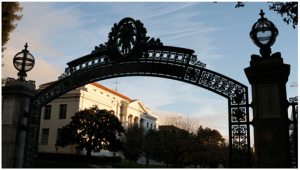Post Date: Aug. 1, 2018 5:09:54 PM
Los Angeles is a rich melting pot of cultures, backgrounds, and perspectives about life and liberty. Coming from experiences lived mostly in the middle of the country, I’ve been surprised by how the many ethnic cultures blend so well here. For example, I didn’t initially realize that Los Angeles is home to the largest Persian community outside Iran. And at the same time, LA boasts a vibrant Jewish community, many of whom also originate from Iran, called Mizrahi. Of course, greater Los Angeles is home to vibrant Asian communities – e.g., Koreatown, Little Tokyo, Chinatown, and Little Saigon; and a person cannot traverse far in Los Angeles without experiencing the richness of Hispanic and African-American culture. All these communities (and more) contribute unique elements to LA’s civic culture, and in the timeless American tradition, they make the whole much greater than the sum of its parts, even with ups and downs along the way.
UCLA’s campus is in many respects a microcosm of Los Angeles, particularly in the way that UCLA community members engage positively to enrich the campus culture. This synergy does not happen by accident, as apparent from the many examples of campuses that struggle with inclusiveness. A few clues to the success of UCLA (and most other UC campuses) can be found in how they proactively cultivate success for low-income students. For example, UC campuses are nearly the only examples of large, public universities in which the graduation rates of students who receive federal Pell grants are virtually identical to the general student population. The linked article highlights several systematic programs that promote student success. Moreover, my impression is that the general environment of inclusiveness – the simple but often elusive feeling of belonging – at UCLA and other UCs provides a broad and stable foundation that subdues many of the common anxieties of college life.

The success of the diverse UCLA student body clearly translates into the real world. The primary rationale for public higher education is to provide an engine for societal upward mobility. By this measure, UCLA and other UC campuses are clearly leaders, as documented in a recent study. When prospective and current students are made aware of this information, they become even more motivated to excel in their studies. Moreover, UCLA goes out of its way to highlight members of its community who are first-generation collegians such as in the recent profile of such UCLA faculty, including MAE’s own Prof. Laurent Pilon:
But for all the benefits of inclusiveness on campus, one main challenge exists – and must remain. Specifically, universities must cultivate neutral ground for the free expression of all ideas from every perspective, except those that promote violence toward others in the community. Today’s world, including segments of every community, includes some who promote hateful ideas that elicit thoughts of condemnation and even banishment from people who value inclusiveness. But we, as stewards of the neutral ground, should resist the temptation to banish (except under the threat of violence) while at the same time embracing our right to critique, and publicly condemn when warranted. Collectively, we must realize that the only durable antidote to hatred is kindness, with the corollary that exiling hateful ideas from the public square makes them grow in isolation, rather than shrink under the light of scrutiny and debate. My colleague Prof. Greg Carman pointed me to the following TEDx talk by Prof. Jeffrey Howard of Essex University that makes a compelling case for cultivating space for all points of view:
Finally, as contemporary public debates on the subject of immigration rage on, I have been thinking about my ancestors (mostly Germans) and their immigration experiences in the US. From this article, I was surprised to learn that, as the US Civil War began, the Secretary of War Simon Cameron ordered that all Union soldiers needed to be able to speak English. The great President Abraham Lincoln quickly rescinded the order and even allowed entire regiments of specific foreign language speakers (including German, in Blenker’s 8th New York). The lessons here are many, but perhaps foremost among them are: (1) that new immigrants have often been willing to go to amazing lengths (even to die) to serve their adopted country, (2) yet at the same time, they also needed compassionate leaders to advocate for them in words and policy so that they could live the American Dream. So, in this true story, the Germans and other immigrants who survived the fighting proceeded to bless their adopted country in myriad ways; Lincoln is viewed as perhaps the greatest leader in US history; and Cameron and his short-lived, anti-immigration Know-Nothing party became merely an ignominious historical footnote.
(Note: I apologize for skipping a bi-monthly post, i.e., June. This summer has been rather busy with many new activities for me.)
